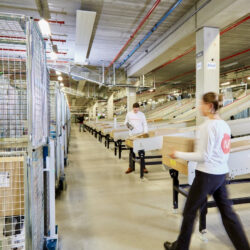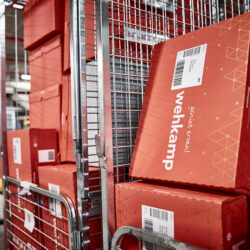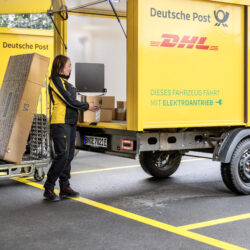Governmental guidance needed for future-proof transport

Multiple organizations are passionately trying to make the transport sector more sustainable, but are running into obstacles in practice. During the Transport Debate, both Wehkamp and DHL made notable appeals to the government. Wehkamp called for legislation to reduce the gigantic return flows, while DHL asked for more pragmatism around alternative fuels and hybrid vehicles.
By Marcel te Lindert
The first to call for more governmental control during Management Productions’ annual Transport Debate was the Dutch government itself. Dylan Koenders, Director of Innovation and Strategy at the Ministry of Infrastructure and Water Management, explained that there will be strong long-term growth in the demand for transportation, both of people and goods, but the infrastructure does not offer enough capacity to accommodate that growth. “We’re also running up against limits from a sustainability perspective. I’m not just talking about carbon dioxide, but also about emissions of nitrogen and particulate matter. We don’t have the money to invest in infrastructure. The budget for that is already fully allocated until 2040.”
Therefore, other measures are needed to meet the growing demand for transport. First and foremost, Koenders advocated innovation to enable smarter use of the available infrastructure. Other solutions included pricing for the use of infrastructure, and imposing standards in terms of which fuels may be used, for instance. “The fourth solution is setting priorities. Perhaps as a government we should give more guidance and make choices about which flows may or may not use the infrastructure.”
Customer ordering behaviour
During the Transport Debate, Wehkamp also urged the government to intervene. Currently, almost half of all products sold by the online retailer are returned. The company wants to put an end to this, because the costs are getting out of hand, according to Schelte Halma, Head of Supply Chain Management & Fulfilment at Wehkamp. “To put things in perspective, we need 20 people for order picking but 250 people for processing returns. We’ve tried everything to reduce the cost of the returns process, from smart IT systems to offering consumers personalized advice, but nothing has helped. We won’t succeed in changing customer ordering behaviour without legislation.”
In fact, Wehkamp has already managed to achieve a small change in ordering behaviour by introducing a 50-cent fee for each product returned. Incidentally, that amount is nowhere near high enough to cover the return costs, for which the returns process at the distribution centre alone can amount to 5 or 6 euros per item. “But our return rate is now 10% lower. We have now lost those customers who ordered €15,000 worth of goods per year, only to return 85% of them.”
Pragmatism
In terms of the next step, Wehkamp regards a 40% return rate at still too high. One option is to increase the charge for returning goods, but the online retailer is afraid of pricing itself out of the market. “We had hoped that other e-tailers would follow our lead. Some did, but there are also some web shops that are only focused on gaining market share and will never charge a return fee. That’s why we need help from the government,” stated Halma.
Wehkamp’s contracted transport partner, DHL, also had a message for the government during the Transport Debate. The parcel carrier is working hard to make its fleet more sustainable, and half of its delivery vehicles – 2,500 in total – are already battery-powered. But DHL is now approaching the limits of what else it can do. “For example, the battery pack means that electric delivery vans weigh over 3,500 kilos, so by law drivers require a category C driving licence. We currently have an exemption for this, but that will expire soon and it’s unclear whether it will be renewed,” said Roeland Hofman, COO of DHL.
Hybrid vehicles
Another problem concerns improving the sustainability of the trucks that transport parcels between DHL’s various depots. The government is adamant that all these vehicles must be electrified, according to Hofman, but there is no affordable and feasible solution for doing that in the short term. Therefore, he advocated a stronger focus on alternative fuels – such as HVO – and the use of hybrid vehicles. This would enable significant reductions in emissions in the short term, but the government offers little incentive for these options. “The energy transition in transport will be impossible unless the government takes a more pragmatic attitude,” he stated.
Not all participants agreed with all the appeals made to the government. Multiple people called on Wehkamp to take the risk and start charging the 5 or 6 euros needed to cover the costs of every return. As a Member of the European Parliament on behalf of the Dutch political party VVD, Caroline Nagtegaal – who had kicked off the Transport Debate – is a strong proponent of less government interference. “I think the EU is too focused on achieving percentages and deadlines. We should not only set goals and make plans, but also help to realize them. And if it appears that those goals are not being achieved, we shouldn’t just try to regulate things even more,” she said.










